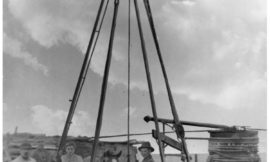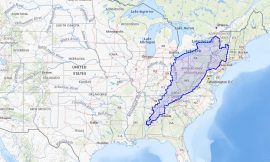Beth recently wrote in and gave an excellent suggestion on a topic that I realized we hadn’t covered in a single episode. She wrote asking for “advice on managing mineral rights from far away, particularly what services I can expect from an attorney, what might be better handled by an independent engineer or landman, or what I’ll have to do myself.”
This is a very common situation where you may own mineral rights or royalty interests in another state and you need to research your interests either through the county courthouse or the state oil and gas commission or you may need the services of a professional in that state but you may not be able to meet with them in person.
In this episode we cover tips for managing mineral rights and royalties from out of state by hiring a team of trusted advisors. Specifically, how landmen, engineers, attorneys, and accountants can help you, and how to go about hiring a professional to get help with your minerals and royalties.
Be sure to also subscribe on Apple Podcasts via the link above and please leave us an honest rating and review. We read every one of them and sincerely appreciate any feedback you have. To ask us a question to be featured on an upcoming episode, please leave a comment below or send an email to feedback@mineralrightspodcast.com.
Getting Started
Chances are that you may have recently inherited mineral rights or royalties and are trying to make heads or tails of what to do first.
In fact, Justin talks about the first steps that he and his family took when they found out they had inherited mineral rights in Episode 116. (Spoiler alert: The first step is likely to involve the help of an attorney).
This is because you need to get the property or properties transferred over to your name. If your relative had their estate in order and perhaps had all of your interests transferred into a trust then you probably don’t have to go through probate (not an attorney so there may be edge cases that I’m not aware of but that is the general consensus).
If your relative didn’t hold the properties in a trust, then you will have to go through probate. This is where you will need to hire an attorney in the state where the mineral rights or royalty interests are located. The requirements vary from state to state but in general you usually have to go through what is called an ancillary probate in that state. This is a separate probate for the mineral or royalty interests that is filed in the county where the interests are located and a court order will verify that you are the correct owner and issue a deed to that effect that will be recorded in that county.
So many times when people find out that they have inherited mineral rights, the first step will be to hire an attorney in the state where the minerals are located. The estate attorney that you are working with on the overall estate can usually help refer you to someone but if they don’t have any contacts in that jurisdiction, we’ll cover at the end how to find someone qualified.
Common Types of Help Needed
- Attorney: We already covered the first one but to recap: getting help from an attorney to transfer the interests to your name is the most common type of professional help needed with minerals and royalties.
Consultant or Petroleum Engineer
Another professional that you might need to hire is a consultant who can perform a valuation or appraisal of your property. You may want to get an estimate of value to help with negotiating the sale of a property or to help with evenly dividing up assets between family members. And, if you do end up selling a property and depending on the tax laws at the time of the sale, you may want to claim a step-up in cost basis to minimize capital gains tax liability. This is what I do for a living at my company Silverheels Investments. We work with individual mineral owners and investors and provide all levels of valuation services for oil and gas interests.
When hiring someone to perform a valuation, ideally you want someone who is familiar with your area. I also recommend finding someone who is willing to provide a free consultation to understand your needs and to make sure that it makes sense to get a valuation. For example, it may not be cost effective to have a full-blown IRS appraisal and formal report to determine the cost basis at the time of death if the interest is small. This is because it may cost you more for the appraisal than you would owe in capital gains taxes.
On the other hand, if you only need an estimate of value to help with negotiating a sale or for buying or selling with a family member, then it might actually cost less than you would think and then you have an objective basis for your negotiation.
Landman
If you recently inherited mineral rights or royalties, you may wonder exactly what you own. In other words, what is your undivided interest in the property in question (and where are all the properties located)? Do you own 1/8th or ¼ of the minerals interests in that tract? The governing documents in this case are the documents like deeds that are recorded with the county clerk and recorder. Other times trust documents will dictate who owns what. In any case, one of the first calls that you should make to get an answer to these questions is to a landman (note: even women in this profession are called landmen, it is an artifact of the patriarchy in the oil and gas industry which is finally changing).
A helpful tip to save you some money is to first contact the operator if you are dealing with a producing property. They obtain what is called a title opinion before drilling a well and have a breakdown of who owns what. You may be able to find what you are looking for without having to hire a landman or an attorney to perform a title search!
What we’re referring to here is your net interest in the property. This is sometimes described in terms of the number of Net Mineral Acres. For example, if you own an undivided 1/10th interest in a tract that is 10 acres in size, you would own 1 Net Mineral Acre. The term Net Royalty Acres is also used which talks about the net acreage in terms of the lease royalty rate or royalty interest. We talk about the difference between a Net Mineral Acre and Net Royalty Acre in more detail in Episode 18.
If there is a dispute about the net acreage, this is where a title search would need to be performed. A title search is where you research the chain of title in the county clerk and recorder’s office (either in person or online) to trace back from what is called patent to present. In other words, when the land was patented or granted from the U.S. government to an individual all the way to the present day. We talk about how to perform a title search in Episode 10 so you can listen to that episode if you are presented with this situation. Which brings us to the next topic – what you can do for yourself.
What You Can Do Yourself
- Title search – The caveat is there is some nuance on how to interpret a deed so if this is unfamiliar territory, you can do the majority of the leg work in terms of copying deeds, oil and gas leases, etc. and recording these in a runsheet and then you can give them to a landman or an attorney to interpret for you if you have any questions.
- Running title is definitely something that everyone can do partly on their own or completely on your own, depending on your background. The good thing is that most counties have digitized their records and you can run title from the comfort of your home.
- Searching state oil and gas commission records. This is something that all mineral and royalty owners should know how to do. The reason for this is because this is where you need to go in order to stay on top of the activity level in your area and to learn where permits are getting filed and where new wells are coming online. Most states have usable websites with searchable maps where you can locate your property and see if any permits, spacing orders, or other activity is occurring on or near your interests. This is especially useful because most lease offers will come in conjunction with a spacing request that is filed by a company or when a company files for drilling permits for wells that will cross your minerals. If you get an unsolicited lease or purchase offer in the mail then this is the first place you should go to find out what is going on. Usually these offers are made where new wells are going to be drilled (open acreage for new leases – you don’t have a producing well that is holding an existing oil and gas lease).
- One area that again crosses over between needing professional help and doing some of the work yourself is negotiating an oil and gas lease. We talk about this in more detail in MRP 6: How to Negotiate an Oil and Gas Lease. An oil and gas lease is a legal contract between the mineral owner and the lessee which is usually an oil and gas company (or someone working on their behalf). There are certain guidelines you can follow for the types of terms and clauses that should or should not be included and this should be the framework for your negotiations. In episode 6 we cover important clauses like the royalty rate, not allowing post-production costs, the lease term, the pugh clause, and the depth clause. Click Here to Download my Free Oil and Gas Leasing Resource Guide.
- A helpful resource with negotiating an oil and gas lease are other mineral owners. Asking relatives what terms they are getting or going to mineralrightsforum.com and searching for the county where your minerals are located you can often see others posting what terms they are getting so you can use this to help get a higher royalty rate and lease bonus by knowing what the current market rates are.
- Once you have an idea of your target terms, I definitely would recommend getting help from an attorney to ensure that the language in the lease is favorable to you and that the agreed terms are covered. You can sometimes search for other oil and gas leases that have been recorded in your county and use that as a starting point for making any changes to the lease but definitely have an attorney familiar with oil and gas law review it before signing.
Who to Hire for More Help
To recap, here are the professionals that can help you manage your out-of-state mineral rights or royalties:
- Attorney: for help with probate, transferring ownership (deeds), or for reviewing an oil and gas lease before signing.
- Engineer: for help with understanding the value of your interests for negotiating a sale, transferring property between family members, or to determine a step-up in cost basis to minimize capital gains tax liability
- Landman: for help with running title & verifying what you own and how much you own.
How to Find the Right Help
Start with your existing set of advisors. Ask them how familiar they are with oil and gas mineral rights and royalties. If they are not already familiar and experienced with oil and gas matters, don’t try to educate them about this, instead find someone who specializes in this.
Go to mineralrightsforum.com and ask for references from other mineral and royalty owners, look in the directory for those who advertise on that site, listen to previous episodes of this show where we interview professionals with minerals and royalties experience, go to the National Association of Royalty Owners (NARO) Website – many of our board members provide services to mineral and royalty owners: CPA’s, accountants, engineers.
Hope this is helpful, as always this is not legal or tax advice but we are sharing this for educational purposes only. Good luck!
Resources Mentioned in This Episode
- MRP 6: How to Negotiate an Oil and Gas Lease
- Click Here to Download my Free Oil and Gas Leasing Resource Guide
- MRP 10: How to Perform a Title Search
- Click here to get my free runsheet template to help you get started with your title search
- We talk about the difference between a Net Mineral Acre and Net Royalty Acre in more detail in Episode 18.
- If you need help with a valuation of your oil and gas property, contact me at Silverheels Investments LLC
- MRP 116: Justin’s Journey Inheriting Mineral Rights and Royalties
Thanks for Listening!
To share your thoughts:
- Leave a comment or question below (we read each one and your question may be featured in a future episode)!
- Ask a question or leave us feedback via email or voicemail: (720) 580-2088.
To help out the show:
Click the Apple Podcasts Logo Above to leave us a rating & review. It really helps us reach those that need to hear this information and only takes a minute. We greatly appreciate it! Plus, you can get a shout out on a future episode!
Thanks again – until next time!





Pingback: MRP 123: How to Hire a Mineral Manager – The Mineral Rights Podcast